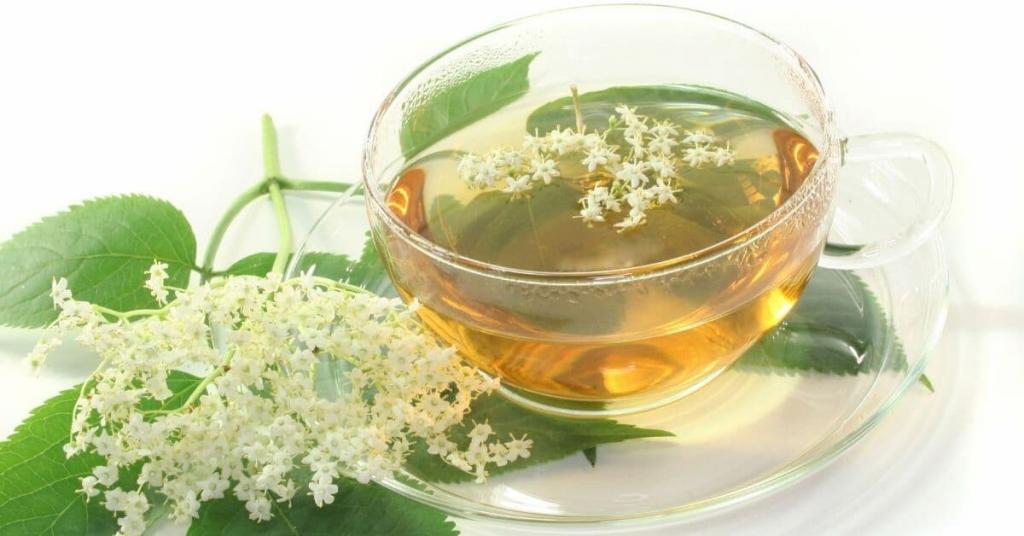Elderflower tea is a delicious drink that offers many health benefits. It has been known to help with sinus inflammation, symptoms of cold and flu, sore throats, bronchitis, allergy symptoms, and much more! This light, crisp flavored herbal tea is a great way to help support the immune system along with overall health and wellness and deserves a place in your natural medicine chest.
In this article, we’ll go over the health benefits associated with elderflower tea as well as discuss what you need to know about possible side effects and an easy recipe.

Ready to get started?
This post may contain affiliate links, which means I’ll receive a commission if you purchase through my links, at no extra cost to you. Please read full disclosure for more information.
What Is Elderflower
Elderflower is a plant (actually called Sambucus nigra) that can be found in many areas and produces beautiful flowers and small tart berries.
These flowers, in addition to the berries, have long been used in traditional or folk medicine and have become well known as having potent herbal properties that are helpful for cold and flu, support for the immune system, and an allergy aid because they are a great source of vitamin C, the flavonoid quercetin, and contains powerful antioxidants.
Health Benefits Of Elderflower Tea
There are quite a few benefits associated with elderflower tea.
Here are just a few:
- Provides antioxidants
- Helps with fever
- Soothes sore throat
- May reduce inflammation
- Can help detoxify the liver
- Boosts immune system
- Helpful for sinusitis, bronchitis, colds and flu
As you can see, elderflower tea is a helpful drink that has an array of amazing health benefits.

Potential Side Effects Of Elderflower Tea
Even though elderflower tea is generally considered safe and side effects are rare, there are a few conditions and situations that should be taken into consideration before enjoying a cup of this delicious tea.
And as always, please do your own research and check with your healthcare provider to see if it’s safe for you.
1. Digestive Upset
Parts of the elder tree contain a chemical that produces cyanide which can cause digestive upset, nausea, diarrhea, and vomiting if ingested in large amounts.
To avoid this be sure to use cooked berries or flowers, not the seeds, stems, leaves, or roots.
2. Pregnancy And Breastfeeding
Due to a lack of data, it is generally recommended that women who are pregnant or breastfeeding not use elderflower or elderberry.
3. Blood Sugar
For some people with blood sugar issues (such as diabetes), there is some concern that elderflower might lower blood sugar levels to unsafe levels. If you have blood sugar problems and use elderflower, be sure to talk to your health care provider and monitor your blood sugar levels.
4. Surgery Risk
While generally considered safe, if you are having surgery be sure to tell your doctor if you are taking this or any other natural remedy because it could affect blood sugar levels after surgery. Your doctor may recommend you stop taking elderberry or elderflower a few weeks before surgery just to be safe.
Elderflower Tea Recipe
If you’ve read the benefits and possible side effects and feel that elderflower tea is something you’d like to try, here is an easy recipe to get you started.

Ingredients
- 1 Tablespoon of fresh elderflowers (dried will work too)
- 1 cup hot water
Optional Ingredients
- 1/4- 1/2 tsp raw honey or your favorite sweetener (or to taste)
- 2 Tbsp. dried elderberries or elderberry syrup
- squeeze of fresh lemon juice
Instructions
- Add one Tbsp. of fresh elderflower petals or dried elderflowers into a pot and pour in one cup of boiling water.
- Let the flowers steep for 10 minutes (a little longer is ok too)
- Strain the elderflowers and drink the delicious warm tea
Helpful Tips
- If you’re using freshly foraged blossoms, make sure that you pick off the flowers and remove all stems. If there are any bugs they will need to picked off as well
- If fresh elderflowers cause stomach upset, try dried flowers instead
- For added health benefits, combine elderflowers with herbs or herbal infusions like
*Yarrow– for fever
*Chamomile– for restful sleep
*Nettle-for allergies
*Elderberries or elderberry syrup– for extra immune boost
*Turmeric and/or Ginger– for immune system and inflammation
If you would like to add a little more flavor and additional health benefits you can add raw, local honey and lemon as well.
FAQ’s About Elderflower Tea
Still have a few questions? No problem! I’ll try to answer them here 🙂
1. Where Can I Find Elderflowers For Tea?
That depends. If you are looking for fresh flowers, you may be able to find them in your yard or a friend or neighbors (just be sure the plant is not sprayed and you are certain that it is an elderberry plant).
If you’re interested in dried flowers, you may be able to find dried elderflowers at a bulk food or health food store, but if you can’t get it locally you can always try these dried, sifted organic elderflowers found online.
2. When Is The Best Time To Drink Elderflower Tea?
You can enjoy elderflower tea any time you like. If you are combining elderflower with other herbs for relaxation, right before bed would be a great time.
If you are drinking this light, delicious tea because you have a cold or flu symptoms, enjoy it whenever you feel it would benefit you most.
The best part is, there is no wrong time to enjoy a delicious cup of tea!
3. Is It Safe To Drink Elderflower Tea Everyday?
It is generally considered safe to drink one or two cups of tea each day, but that would be something to ask your health care provider about so you can get a recommendation that is right for you.
4. What Does It Taste Like?
Elderflower tea has a light, delicious taste if you use fresh flowers. Tea made with the dried tiny flowers has a little bit of a stronger taste and aroma.
If you choose to add other herbs, lemon slice, or a sweetener, this will change the flavor somewhat giving it possibly a strong taste depending on what is added.
5. What Is The Difference Between Elderberry Tea And Elderflower Tea?
Both elderberry and elderflower have a long history of use and are a great choice during colds, flu, sinus or allergy issues, and respiratory infections because they support the immune system and have antiviral properties.
Since they both come from the same plant they offer similar benefits, the difference is the taste. Elderflower tea is light and has a mild taste while elderberry tea is dark and has more of a tart flavor.
Last Thoughts About Elderflower Tea
Elderflower tea is a light and delicious drink made from small white flowers of the elder trees that offer many health benefits. And while there are possible side effects, it’s generally considered safe to consume as long as you check with your health care provider if you have a health condition or concerns.
If you are looking for a unique tea that is packed with vitamins, minerals, nutrients, has anti-inflammatory properties, antiviral effects, and can be very helpful in supporting your immune system, this is it!
This tea is great combined with other herbs for added benefit and perfect any time of the day. If you haven’t tried this delightful herbal tea yet I highly recommend doing so- especially if you’re interested in boosting and supporting your immune system.
Have you tried elderflower tea? I’d love to hear your thoughts! Feel free to leave a comment or send me a message and tell me all about it.
Printable Elderflower Tea Recipe

Elderflower Tea
Elderflower tea is a delicious drink that offers many health benefits. It has been known to help with sinus inflammation, cold and flu symptoms, bronchitis, allergy symptoms, and much more! This light, crips flavored herbal tea is a great way to help support the immune system along with overall health and wellness.
Ingredients
- 1 Tablespoon of elderflowers (fresh or dried)
- 1 cup boiled water
Instructions
- Add one Tbsp. of fresh elderflower petals or dried elderflowers into a pot and pour in one cup of boiling water.
- Let the flowers steep for 10 minutes (a little longer is ok too)
- Strain the elderflowers and drink the delicious warm tea
Notes
Optional Ingredients:
1/4- 1/2 tsp raw honey or your favorite sweetener (or to taste)
2 Tbsp. dried elderberries or elderberry syrup
squeeze of lemon
Helpful Tips
Yarrow- for fever
Chamomile- for restful sleep
Nettle-for allergies
Elderberries or elderberry syrup- for an extra immune boost
Turmeric and/or Ginger- for immune system and inflammation

Related Articles
- 11 Health Benefits Of Hibiscus Tea (+Possible Side Effects & Easy Recipe)
- How To Make Elderberry Tea (Easy Recipe + Health Benefits)
- How To Make Pine Needle Tea (+Health Benefits And Easy Recipe!)
- Honey Lemon & Ginger Tea (Health Benefits & Easy Recipe)
- 3 Easy And Delicious Liver Detox Tea Recipes
- Delicious Adaptogenic Tea Blends For Balance And Stress Relief

